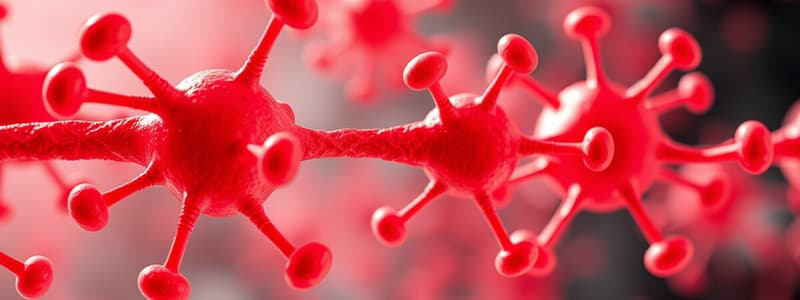Podcast
Questions and Answers
Morphine binds to opioid receptors in both the central and peripheral nervous systems.
Morphine binds to opioid receptors in both the central and peripheral nervous systems.
True (A)
Morphine inhibits potassium channels, leading to increased neuronal excitability.
Morphine inhibits potassium channels, leading to increased neuronal excitability.
False (B)
One of the effects of morphine on the respiratory system is a reduced respiratory rate.
One of the effects of morphine on the respiratory system is a reduced respiratory rate.
True (A)
Morphine has no impact on the gastrointestinal system.
Morphine has no impact on the gastrointestinal system.
Repeated use of morphine can lead to physical dependence and tolerance.
Repeated use of morphine can lead to physical dependence and tolerance.
Morphine's mechanism of action includes the activation of adenylate cyclase.
Morphine's mechanism of action includes the activation of adenylate cyclase.
Flashcards are hidden until you start studying
Study Notes
Mechanism of Action (MOA)
- Morphine binds to three types of opioid receptors: μ (mu), κ (kappa), and δ (delta) in both the central nervous system (CNS) and peripheral nervous system (PNS).
- It activates G-protein coupled receptors, initiating a signaling cascade that affects neuronal activity.
- Inhibition of adenylate cyclase occurs, leading to decreased production of cAMP, which lowers neuronal excitability.
- Morphine closes calcium channels, resulting in decreased release of neurotransmitters, which diminishes pain transmission.
- It opens potassium channels, hyperpolarizing neurons and further reducing their excitability.
Effects on Body Organs
Central Nervous System (CNS)
- Provides analgesia, offering effective pain relief.
- Induces sedation, leading to decreased alertness.
- Produces feelings of euphoria, which can contribute to misuse.
- Causes respiratory depression, significantly slowing the breathing rate.
Respiratory System
- Morphine reduces respiratory rate, risking hypoventilation.
- Breathing becomes shallow, impacting gas exchange efficiency.
Gastrointestinal System
- Lowers gut motility, resulting in constipation which is a common side effect.
Cardiovascular System
- Can lead to decreased heart rate, potentially resulting in bradycardia.
- Causes decreased blood pressure, which may contribute to dizziness.
Urinary System
- Promotes urinary retention, making it difficult to urinate.
Endocrine System
- Reduces secretion of hormones such as insulin and antidiuretic hormone (ADH), affecting metabolism and fluid balance.
Additional Effects
- Histamine release can occur, causing itching, flushing of the skin, and possible hypotension.
- Chronic use can result in physical dependence and tolerance, requiring higher doses for the same analgesic effect.
Studying That Suits You
Use AI to generate personalized quizzes and flashcards to suit your learning preferences.


